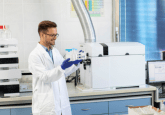Hybrid LBA/LC–MS technology increasingly gaining foothold in bioanalytical community

The emergence of Hybrid LBA/LC–MS has drastically changed the way large and small molecule bioanalysis is currently being done.
In a latest feature on Bioanalysis Zone, it was found that a growing number of laboratories are incorporating this technique in various research projects in both small and large molecule bioanalysis.
In a series of webinars, exclusive commentaries and articles from the Bioanalysis Journal, Bioanalysis Zone featured leading opinions from renowned experts in the field discussing groundbreaking research, benefits and developments in hybrid LBA/LC–MS in a 3-month spotlight focus.
In addition to the benefits of hybrid LBA/LC–MS, a survey and panel discussion also revealed several uncertainties and challenges associated with this new technique – notably in the absence of standardizations in methodological practices.
Hybrid LBA/LC–MS combines the specificity of LBA and sensitivity of LC–MS assay overcoming shortcomings of utilizing LBA and LC–MS independently.
The spotlight was launched with a survey to gain insight into the use hybrid LBA/LC–MS among current users and future perspectives about this technique.
Results from the survey raised some very interesting key findings which were discussed by a panel of experts from Pharma and CRO backgrounds. This included the growing application of hybrid assays.
Commenting on this increase one of our panellists, Rand Jenkins (Scientific Director, PPD® Laboratories) said: “I believe we are seeing increasing usage in discovery and early development of hybrid LC–MS/LBA assays and part of that is coming from the ability to do generic methodologies which are not requiring specific custom reagents.”
Furthermore, both the survey result and panel discussion highlighted a clear division among users, particularly in methodological practices, acceptance criteria and internal standards.
Addressing this concern the panelists agreed that though challenges remained it should not be as Jenkins put it a “showstopper”. Panelists emphasised on the growing intricacy of the technology and the science behind it too.
The survey and panel discussion also revealed the many benefits associated with hybrid assays, including examples from recent studies. As molecules are getting further complex, a multifaceted approach is increasingly needed. A technique such as hybrid LBA/LC–MS meets this requirement.
Commenting on this strength of hybrid LBA/LC–MS Suma Ramigiri (Senior Market Manager, Pharma/CRO Business Unit, SCIEX) stated: “The next generation of molecules are becoming more and more complex, and there are multiple ways to answer the biological questions. Time will ultimately resolve the workflow and technology choice especially when you are in the discovery and development process in which time is a limitation. We don’t want to waste a lot of time developing a new reagent or a specialist reagent, on the other hand we have seen cases where direct LC–MS assays don’t have enough selectivity on its own.”
“So the best solution is to use both, the generic capture, which doesn’t require a lot of time and can be readily available followed by the most selective detectors such as LC–MS. This way you are not compromising any results for data quality.”
The panel discussion event was an exciting opportunity to initiate dialogue between scientists from very different backgrounds. Interdisciplinary dialogues like these are rare. But have great impact on the science, technology and workflows used.
Megan Wiberg (Manager, Immunochemistry Laboratory Operations, PPD®) another panellists added: “It is important to have people from different backgrounds come together more often in approaching assay development proactively and consider both methodologies in development process rather than coming together when an issue is faced.”
“Forums like this are excellent in bringing more people to becoming aware of this type of technology and the challenges and benefits”
To view all the contents and resources for this focus on hybrid LBA/LC–MS visit: https://www.bioanalysis-zone.com/category/spotlights/hybrid-lba-lcms/
–ENDS–
About Bioanalysis Zone
Since launching in 2011, Bioanalysis Zone has attracted over 7,500 active members from the global bioanalytical community, representing the pharmaceutical, biotech and CRO industries, along with academia and healthcare. Each month, thousands of members visit the site to read industry news, original research exclusive interviews and commentaries. Membership is completely free of charge. Sign up online at: https://www.bioanalysis-zone.com/register.
About Future Science Group
Founded in 2001, Future Science Group (FSG) is a progressive publisher focused on breakthrough medical, biotechnological and scientific research. FSG’s portfolio includes two imprints, Future Science and Future Medicine. In addition to this core publishing business, FSG develops specialist eCommunities. Key titles and sites include Bioanalysis Zone, Epigenomics, Nanomedicine and the award-winning Regenerative Medicine. www.futuresciencegroup.com.
The aim of FSG is to service the advancement of clinical practice and drug research by enhancing the efficiency of communications among clinicians, researchers and decision-makers, and by providing innovative solutions to their information needs. This is achieved through a customer-centric approach, use of new technologies, products that deliver value-for-money and uncompromisingly high standards. www.future-science-group.com.






